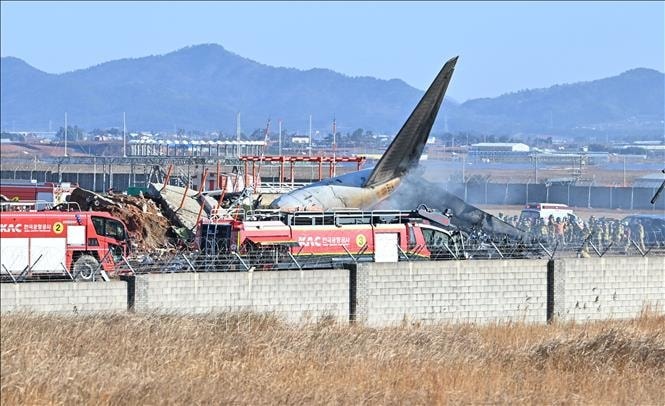A Jeju Air plane carrying 181 people skidded off the runway and crashed into a wall, causing a violent explosion. Aviation experts have questioned the existence of the wall.

According to Reuters news agency on December 29, in a media interview, Mr. Geoffrey Thomas at British aviation magazine Airlines News talked about the presence of a wall at the runway of Muan International Airport.
“There should never be a wall near a runway, absolutely not,” he said. “When you look at it, you see the plane leaving the runway. Then the plane travels about 100 meters, maybe less, and hits that wall. Now, I haven’t studied it, but I can say that it is a complete violation of international standards to put a wall there. There is no doubt about it.”
Mr Thomas also raised questions about how the crash was handled on the ground. “There are still a lot of questions about how the ground response to this incident will be handled,” he said.
In such circumstances, Mr Thomas said, ground crews could have been more prepared before the plane approached the runway. “For such an emergency, why weren’t fire trucks right next to the runway? Why weren’t they spraying foam on the runway?”… Why did the plane land so far down the runway that it couldn’t stop before it left? Why was there a brick wall at the end of the runway? There are a lot of questions that we don’t have answers to at this stage.”
Earlier, according to Yonhap news agency, the Korean National Fire Agency said that when the crash happened, the plane was carrying 181 people, including 6 crew members. Only two crew members survived.
The Jeju Air Boeing 737-800 aircraft departed from Bangkok (Thailand) at 1:30 a.m. (local time) and was expected to arrive in Muan at around 8:30 a.m. Most of the passengers were Korean (173 people) and there were 2 Thai citizens, mostly between the ages of 40 and 60. Authorities are still actively searching for the bodies and have identified 22 victims.
According to the Ministry of Land, Infrastructure and Transport, an air traffic control station issued a bird strike warning just six minutes before the accident. A minute later, the pilot issued an emergency signal.
Following the tragedy, South Korean acting President Choi Sang-mok designated Muan as a special disaster zone. The presidential office said it had convened an emergency meeting to discuss the entire incident, inter-agency coordination to investigate the cause of the accident, and medical and other support. The presidential office also decided to maintain a 24-hour emergency response system.
Jeju Air CEO Kim E Bae apologized and shared the pain of loss with all the passengers' relatives, and pledged to provide necessary support to the victims' families.